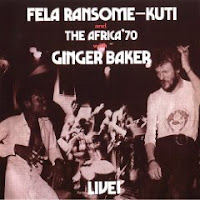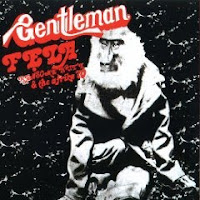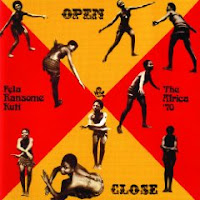 Fela Ransome-Kuti and The Africa’70
Fela Ransome-Kuti and The Africa’70
With Ginger Baker – Live!
(Knitting Factory Records)
Fela Ransome-Kuti and The Africa’70 with Ginger Baker – Live!, is one of the latest in the series of albums reissued by The Knitting Factory, represents some of Fela’s earliest, most raw, relentlessly rhythmically aggressive work. Originally released in 1971, it’s one of the first records Fela put out under the band name Afrika 70 and calling his music “afrobeat.â€
All three songs on the record are punchy and full of hard-hitting breaks. When compared to Fela’s later work, they sound harsh, and underdeveloped lyrically. Here, Fela has yet to develop his own style vocally: he still seems to be fashioning a Yoruba-James Brown style reminiscent of his first afrobeat recordings, The ’69 L.A. Sessions. Although Ginger Baker is sitting in on drums, Tony Allen, Afrika 70’s original drummer, is also playing simultaneously. Although the two drummers are not in perfect lock-step together, they manage to avoid stepping on each other’s rhythms and foster a thick backdrop along with the clave, shekere, and congas.
Fela had yet to take on the tenor saxophone at this point in his career, so one can notice the sharp, fine, pointed tenor sax solos during the extended improvisation sections, very different than the sloppy, edgy, tenor sax extended solos Fela became known for later on. The keyboard solos are his, however.
The primary feeling one takes away from listening to these songs is raw emotion. Particularly in a song like “Black Man’s Cry,” Fela screams and moans conveying the frustration and angst the title of the song connotes. The dynamic horn breaks clashing with Fela’s voice and the live, under-produced production value help foster that scratchy, desperate sound.
 Fela Kuti
Fela Kuti
Confusion/Gentleman
(Knitting Factory Records)
Now that late Nigerian composer-musician-human rights activist Fela Anikulapo Kuti is immortalized on Broadway in the hit musical Fela!, I can’t help but join the Fela-craze. In the Confusion/Gentleman, reissue we’re given four tracks replete with signature Fela jazz, funk, and harmonizing vocals. “Confusion, Pts 1 & 2†is a 25-minute world beat explosion, while “Gentlemen†is a funky number of horns and rhythms. However, it is “Fefe Naa Efe†that grabbed my attention the most. Why? From my understanding, it’s a tune about the celebration of a woman’s breast. (I could be wrong.) According to Fela himself, on the track’s intro he recites an Ashanti proverb from Ghana that’s stated as, “it is because of the beauty that is why a woman holds her breast when she runs, not because the breast is going to fall.†For this is why Fela Kuti is now an international icon – he was the truth.
 Fela Kuti
Fela Kuti
Roforofo Fight/The Fela Singles
(Knitting Factory Records)
Enough can not be said about the pioneer of Afro-beat, worldwide phenomenon Fela Kuti: remarkable musician, singer and composer, die-hard political activist, and a cultural revolutionary. Roforofo Fight/The Fela Singles is a re-release of Fela Kuti’s 1972 album that features the original tracks (“Roforofo Fight, “Question Jam Answer,†Trouble Sleep Yanga Wake Am,†and “Go Slowâ€), in addition to two unreleased songs (“Shenshema†and “Ariyaâ€). Filled with the West African highlife style of music (driving African rhythms, jazz and big horns), Roforofo is filled with the musical fire of a man who’s life is still celebrated around the world.
 Fela Kuti
Fela Kuti
Shakara/London Scene
(Knitting Factory Records)
When one thinks of a Nigerian singer-songwriter-composer, quite possibly one of two names comes to mind: soul, R&B singer Sade or world-renowned musician and cultural rebel Fela Kuti. Though it’s been over 10 years since the late musician Fela Kuti passed, his musical legacy lives on. Shakara/London Scene is a combination of Fela’s 1971 recordings with his band Nigeria 70 (Shakara) and the beginning of a new style of rhythms (London Scene) in 1972. Still balancing the use of heavy horns and African sounds, Shakara/London Scene is a bit more jazzy, smooth, and funky in their approach. Known to dislike playing pre-recorded music…actually, he hated it; these albums come off as more of jam sessions with social commentary than any studio project could pull off. Definitely a must-have for any Fela fan.
 Fela Kuti
Fela Kuti
Open & Close/Afrodisiac
(Knitting Factory Records)
Open & Close/Afrodisiac is as stated; a combination of two of Fela Kuti’s most memorable and funky Afrobeat albums to date. The album opens up with three tracks from Open & Close, followed by four tracks off of Afrodisiac. Both albums were supposedly recorded in the early 1970s and could not fit more perfectly into that time period.
First track “Open and Close†is an almost 15-minute-long song that sets the tone of the album with its vivacious horns, intoxicating beats and tantric, feel-good lyrics.
There is no track on this album less than 7 minutes in length, and you’ll be wishing for more once the album’s through. Favorite tracks include “Je’nwi Temi†(Don’t Gag Me), which features an intense array of sound that simmers down at the perfect moment only to build up to a frenzied, horn-induced climax. This song was also featured in the film The Visitor. “Swegbe and Pako,†although a slower groove, will have you jamming all the same.
If you’ve never been introduced to Kuti’s music before, immediately upon first listen you’ll recognize his sound as something you can groove to, whether he speeds it up or slows it down. (Think Santana meets the soundtrack to Boogie Nights; cheesy 80s rock not included.)
Kuti, after all, is the one who coined the term “Afrobeat,†and who helped to build the foundation for the Nigerian-based, jazz, psychedelic and percussion-infused genre. While certainly he deserved as much fame as say, James Brown or Jimi Hendrix, Fela remains underexposed for many reasons, but mainly because he was anything but mainstream. Kuti often refused to perform a song live that he had already recorded in the studio, and many of his tracks extended into 20-minute-long grooves, and those were not including his live jams (some which averaged around 45 minutes long). Nonetheless, the musician had mystique and talent that has influenced countless artists, including David Byrne, Brian Eno and TV On the Radio.
 Fela Kuti
Fela Kuti
Koola Lobitos 1964-1968/The 69 Los Angeles Sessions
(Knitting Factory Records)
Fela Kuti’s Koola Lobitos 1964-1968/The 69 Los Angeles Sessions is one album of Fela’s music broken into two sections. The first section consists of six unreleased tracks from 1964-1968, and the remaining ten are from 1969’s Los Angeles sessions.
The album opens up with tracks like “Highlife Time†and “Omuti Tide,†which consist of West African, trumpet-filled melodies from a young Fela Kuti (apparent within his youthful vocals). “Ololufe Mi†is a noteworthy track, present again on the album as track thirteen; a revamped version called “Lover.†Unlike most of Fela’s recognized work, his early songs did not contain the fervent political views he was known for expressing within his music.
Track seven begins section two of the album. From the start of “My Lady Frustration,†one can tell the recording equipment used to make The 69 Sessions is better as the sound is most definitely clearer. “Obe†is a track about spicy Nigerian stew that is appropriate to its title with its fast and frenzied beats, while “Witchcraft,†“Ako†and “Wayo†are equally intense and expressive. Overall, the beats are tighter and more coherent here, and you start to hear familiar sounds that are present in later work as Fela incorporates funkier, horn-filled jazz into this section of the record. His vocals are also at his best here, in my opinion. Unlike most of his work, these songs run, at most, about five minutes long. As always, the drum-work is flawless, and this is definitely another record that proves why Fela Kuti is the first name that comes to mind in regards to West African music.



